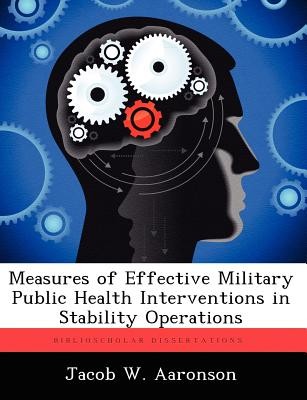
- We will send in 10–14 business days.
- Author: Jacob W Aaronson
- Publisher: BiblioScholar
- ISBN-10: 1249282802
- ISBN-13: 9781249282808
- Format: 18.9 x 24.6 x 0.6 cm, softcover
- Language: English
- SAVE -10% with code: EXTRA
Measures of Effective Military Public Health Interventions in Stability Operations (e-book) (used book) | bookbook.eu
Reviews
Description
There is broad consensus that attention to health sector needs plays an important role in addressing the causes of state fragility, whether to avoid conflict, during conflict, or post-conflict. Based on the premise that health-related interventions during stability operations are intended to improve those health sector issues that may affect state fragility, the evidence suggests efforts to reduce child mortality rates are the most beneficial. While health outcome metrics such as the under-five mortality rate are recommended for assessing long-term effectiveness, relatively short-term military health-related interventions are likely best assessed through a shorter-term outcome metric, such as the neonatal mortality rate, and metrics that more directly measure the output of activities known to affect child mortality. These output metrics include: immunization coverage among 1-year-olds, percentage of births attended by skilled health personnel, number and quality of trained doctors and nurses, and percentage of the population using improved drinking-water sources and sanitation facilities. Importantly, these metrics are not reflective of direct-care services; rather they are consistent with fundamental public health interventions. This would suggest that a focus on military public health interventions rather than the historic tendency to provide direct care services are more likely to positively affect the desired strategic end-state.
EXTRA 10 % discount with code: EXTRA
The promotion ends in 19d.10:27:04
The discount code is valid when purchasing from 10 €. Discounts do not stack.
- Author: Jacob W Aaronson
- Publisher: BiblioScholar
- ISBN-10: 1249282802
- ISBN-13: 9781249282808
- Format: 18.9 x 24.6 x 0.6 cm, softcover
- Language: English English
There is broad consensus that attention to health sector needs plays an important role in addressing the causes of state fragility, whether to avoid conflict, during conflict, or post-conflict. Based on the premise that health-related interventions during stability operations are intended to improve those health sector issues that may affect state fragility, the evidence suggests efforts to reduce child mortality rates are the most beneficial. While health outcome metrics such as the under-five mortality rate are recommended for assessing long-term effectiveness, relatively short-term military health-related interventions are likely best assessed through a shorter-term outcome metric, such as the neonatal mortality rate, and metrics that more directly measure the output of activities known to affect child mortality. These output metrics include: immunization coverage among 1-year-olds, percentage of births attended by skilled health personnel, number and quality of trained doctors and nurses, and percentage of the population using improved drinking-water sources and sanitation facilities. Importantly, these metrics are not reflective of direct-care services; rather they are consistent with fundamental public health interventions. This would suggest that a focus on military public health interventions rather than the historic tendency to provide direct care services are more likely to positively affect the desired strategic end-state.


Reviews